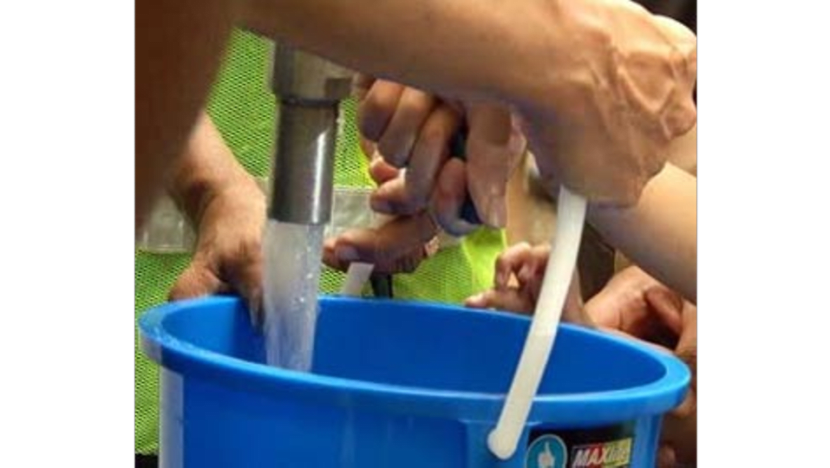No change to water rates this year: Balakrishnan
Minister for the Environment and Water Resources Vivian Balakrishnan has said there would be no change to the structure or to the rates of pricing of water charges this year.

Collecting water from a tap
SINGAPORE: There would be no change to the structure or to the rates of pricing of water charges this year.
Minister for the Environment and Water Resources Vivian Balakrishnan said this in response to a parliamentary question by Workers' Party chairman Sylvia Lim on Monday.
Ms Lim raised the question when the House debated amendments to the Public Utilities Bill and the Sewerage and Drainage Bill, which aim to reinforce current safeguards to enhance the management of water resources to ensure the reliability of water supply.
She asked: "Will the minister clarify whether this amendment is meant to signal any change in the way water is priced. More specifically, is the PUB intending to apportion more of the cost-sharing to consumers, and what assurances do Singaporeans have, that water will still be priced affordably in the future?"
In reply, Dr Balakrishnan said: "I am not making any announcements on new rates or new charges. That's not on the cards at this point in time."
However, Dr Balakrishnan added: "In the long term, a key determinant of the price or the cost of water is the cost of energy. So, no Minister for the Environment and Water Resources in Singapore can ever give you a warranty that water prices will not change in the future."
Dr Balakrishnan also pointed out that in the last financial year ending March 2011, the amount collected in water tariffs and used-water fees was about S$1 billion.
That's less than the S$1.3 billion needed every year to provide safe and secure water supply for Singapore.
Going forward, Dr Balakrishnan said the future cost of water will also depend on other factors "which are beyond our control and are in a sense because of our uniquely water constraint circumstances."
He added: "We are very mindful that by running a most efficient and possible water system we can maintain water at an affordable rate for all our people, for even those low income families through U-Save (Utilities-Save) we ensure that everyone has access to the water that they need.
"We can all turn on our taps today and receive clean safe drinking water at any time of the day, any day of the year.
"We often take this for granted, but behind each tap lies an integrated system comprising over 7,000km of drains, 17 reservoirs, water catchment area which constitutes two-thirds of Singapore, 7 water treatment plants, 5,400km of water mains, 3,400km of sewers, 4 water reclamation plants, and 4 NEWater factories."
Dr Balakrishnan told the House that to continue meeting Singapore's growing water needs, there are two key strategies.
These are to expand local water catchments and to increase NEWater capacity.
He said these developments require the support of corresponding laws which empowers PUB, the national water agency, to carry out its duties effectively.
So the changes include enabling further expansion of the water catchments, stricter controls on pollution and greater clarity on contributions to the national used water system.
To enhance the resilience of NEWater production, the changes propose tighter regulation of discharges of hazardous substances into the used water system.
There will also be greater protection of infrastructure through specific and higher penalties to commensurate with consequences of damage to PUB properties.
There will also be requirements for thorough investigations before any excavation, piling or similar works.
Dr Balakrishnan said: "It is essential that Singapore continues to secure a sustainable and resilient water supply to meet the long term needs of a growing economy and a growing population and to cope with the long term dangers of climate uncertainty.
"To achieve this, our water catchments will be progressively expanded. This will be complemented by expanding NEWater and desalination capabilities and it is therefore essential to ensure the quality of catchment water and adequately protect our water infrastructure."
Ms Lim also raised concern over some clauses in the Bill that would allow PUB to authorise other statutory boards in performing certain duties, including allowing them to investigate issues, and even entry into premises "to search and seize evidence."
She questioned which statutory boards will be involved in these areas.
Dr Balakrishnan said: "For a start, within our own Ministry, NEA officers would also have an interest in littering, and in the maintenance of cleanliness and certainly with respect to our reservoirs, that's an obvious group of people we'll reach out to.
"But I am considering other people - we may have to outsource these routine work.
"But the point I'm trying to make is that it is our duty to make sure whoever we recruit to do this is properly trained, and is held accountable, and performs to the level you would expect of any other public servant."











